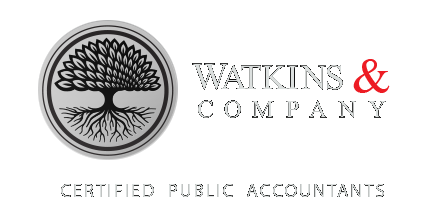5 Best Practices for Small Business Bookkeeping and Record-Keeping
As a small business owner, you know that ultimately, finances are the engine that keeps your business running. Having an efficient bookkeeping system in place, one that is accurate and current is essential for your company’s success. The key to such a system lies in understanding and establishing best practices for small business bookkeeping and record-keeping. This enables you to capitalize on your business’s potential and maintain a smooth operation. Your success matters to us, so our Watkins & Co CPA pros are here to share tips on best practices for small business bookkeeping.
Simple Record Keeping for Small Businesses & Tips for Bookkeeping
We’ve served as professional CPAs for over 30 years now and a large number of our clients are small business owners. Over the years, we’ve heard a number of commonly asked questions about small business bookkeeping, such as, what are the best practices for record-keeping? How do small businesses organize their records? What is the easiest way to keep and maintain your business’s financial records? What are the records that must be kept? Our team at Watkins & Co is here to answer all these questions and more! Most importantly, we want to share a few insider tricks of the trade to ensure that your small business record keeping and bookkeeping systems are comprehensive, easy, and effective.
- Organize Your Records
The first step in good bookkeeping is to organize all of the records that you will need to keep on hand. These are typically documents on income, expenses, payroll, taxes, and other financial information. Create or choose a record-keeping system for small business that works best for you, where relevant documents can be properly stored in one centralized and accessible location, whether that’s on your computer or in hard copy form. Keeping everything organized will help immensely when it comes time to review your books or prepare taxes. It will also minimize any potential errors caused by disorganization or misplacing information.
- Use Automation Tools
Investing in automated accounting software can save you a lot of time and stress by streamlining processes, organizing finances, and automating accounting tasks. Technology can now assist with tax preparation services, payroll processing, budgeting, cash flow planning, tracking expenses, customer invoicing, automatic transaction downloads from your bank, and so much more! Tools like Quickbooks or Xero are also extremely helpful with providing detailed reports to better understand your financials and with ensuring accuracy by eliminating manual data entry errors that could lead to costly mistakes down the line.
- Keep the Right Documents and Records for the Right Amount of Time
For the most part, the IRS and Department of Labor require documents to be kept at least for seven years, depending on the document. For example, all tax-related items need to be kept for seven years, including tax credits, exemptions, deductions, and business income records. Payroll records are typically mandated to be kept as well.
What specific types of records and documents need to be kept?
The IRS record-keeping requirements for businesses and common business records to keep track of include:
- Business registration documents
- Employee information (names, contact information, pay stubs, payroll & benefits information)
- Insurance documents
- All IRS tax forms that you’ve submitted, tax return information
- Bank records & financial statements
- Expenses, purchase receipts, etc.
- Customer invoices, receipts, etc.
- Legal files, including contracts, loans, mortgages, etc.
- Email records
- Any business-related meeting minutes
- Separate Personal and Business Records
Keeping your personal finances separate from those of your business is essential for both legal reasons and practical purposes. It’s important to have a bank account specifically for your business operations, as well as separate credit cards for company use only. It also means keeping track of all income generated by the company separately from your own personal income that may go through the same bank account or card statement. Failing to do this can lead to confusion when it comes time to file taxes or make important financial decisions about your business down the line.
- Stay Up-to-Date with Reporting Requirements & Reviewing Financial Reports
Finally, it’s important to stay current on reporting requirements and deadlines set by regulatory authorities or tax agencies. Being prepared ahead of time can save you from having to scramble at the last minute when deadlines approach or unexpected audits occur. It’s also vital to stay abreast of changes in laws or regulations in your particular industry so that you’re consistently compliant.
Another aspect of staying current and aware is reviewing your financial reports. Be sure to consistently reconcile your bank accounts to check for duplicates or abnormal activity. Reviewing your profit/loss margins, balance sheets, and other trends is an important part of ensuring the health of your business. Most accounting software enables you to set up a variety of repeating reports at designated intervals to help you do this.
Bonus Tip!
The surest way to keep your business successful and operations running smoothly is professional support. Meet with your Watkins & Co CPA regularly to ensure that you’re on the right track and to get help where needed! We’re looking forward to your call!





